|
|
|
Sort Order |
|
|
|
Items / Page
|
|
|
|
|
|
|
| Srl | Item |
| 1 |
ID:
062593
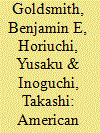

|
|
|
| 2 |
ID:
113173
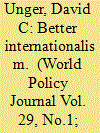

|
|
|
|
|
| Publication |
2012.
|
| Summary/Abstract |
Genoa-Internationalism has many different meanings, but constructive global citizenship should always be at its core. An internationalist foreign policy for the developed countries would use their wealth, economic might, and military power to promote a better, more peaceful, more prosperous world for everyone.
|
|
|
|
|
|
|
|
|
|
|
|
|
|
|
|
| 3 |
ID:
093732
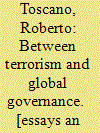

|
|
|
|
|
| Publication |
New Delhi, Har-anand Publications, 2009.
|
| Description |
112p.
|
| Standard Number |
9788124114858
|
|
|
|
|
|
|
|
|
|
|
|
Copies: C:1/I:0,R:0,Q:0
Circulation
| Accession# | Call# | Current Location | Status | Policy | Location |
| 054730 | 080/TOS 054730 | Main | On Shelf | General | |
|
|
|
|
| 4 |
ID:
113358
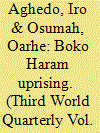

|
|
|
|
|
| Publication |
2012.
|
| Summary/Abstract |
Since the execution of Osama bin Laden and a few other al-Qaeda kingpins, the incidence of international terrorism seems to be on the decline and the 'war on terror' has been applauded as a huge success, with some even arguing that terrorism will fizzle out sooner rather than later. But recent experiences in Nigeria and some other African states reveal that, while global terrorism may be on the decline, the proliferation and radicalisation of local terrorist groups with possible links to al-Qaeda seem to be on the rise. The quest for effective counter-terrorism therefore continues. This article interrogates how Nigeria should respond to the Boko Haram terrorist uprising. Methodologically it relies on both primary and secondary sources of data. It provides an overview of the evolution and dynamics of the uprising in Nigeria, and explores the motivations, strategic operations and responses of Boko Haram. The article shows that the uprising, which engenders general insecurity, is a consequence of governance failure and institutional fragility. Thus, it concludes that, to effectively address the uprising, Nigeria should adopt a human security approach rather than the current emphasis on a repressive state security approach.
|
|
|
|
|
|
|
|
|
|
|
|
|
|
|
|
| 5 |
ID:
091399
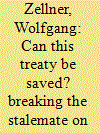

|
|
|
|
|
| Publication |
2009.
|
| Summary/Abstract |
Overshadowed by more pressing issues-Afghanistan, Iraq, Iran, and global terrorism-European security relations with Russia have deteriorated dramatically since the late 1990s. Over the last 10 years, European security policy has been increasingly dominated by unilateral and frequently confrontational approaches.
|
|
|
|
|
|
|
|
|
|
|
|
|
|
|
|
| 6 |
ID:
053734


|
|
|
| 7 |
ID:
133050
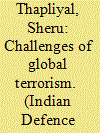

|
|
|
|
|
| Publication |
2014.
|
| Summary/Abstract |
There should be no distinction between a good and a bad terrorist which is what some countries are trying to do. The scourge will consume all unless it is ruthlessly eliminated. Countries sponsoring terrorism might realise that it is like riding a tiger that, one day, they might tall prey to. The biggest worry at these countries which have sulterecl at the hands at terrorists is that Weapons of Mass Destruction may fall into the hands at the terrorists and that catastrophic consequences would tollowi A worldwide integrated approach to tackling terrorism is, therefore, a must.
|
|
|
|
|
|
|
|
|
|
|
|
|
|
|
|
| 8 |
ID:
108767
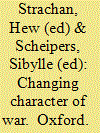

|
|
|
|
|
| Publication |
Oxford, Oxford University Press, 2011.
|
| Description |
x, 564p.
|
| Standard Number |
9780199596737
|
|
|
|
|
|
|
|
|
|
|
|
Copies: C:1/I:0,R:0,Q:0
Circulation
| Accession# | Call# | Current Location | Status | Policy | Location |
| 056384 | 355.02/STR 056384 | Main | On Shelf | General | |
|
|
|
|
| 9 |
ID:
172627
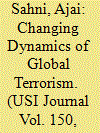

|
|
|
|
|
| Summary/Abstract |
Commentary on terrorism has underestimated the role of sponsoring states and great power destabilisation, giving rise to gross errors of assessment. Mythmaking and a range of distortions have resulted in flawed policies and irrational interventions. Deliberate provocation of hysteria about the ‘rising threat of terrorism’ is contrafactual and has been used as a bogey to justify unilateral interventions by great powers, inflicting appalling human costs. The reality is, global Islamist terrorism is past its ‘half-life’ and is declining. Nevertheless, the circumstances that have animated this, and earlier waves of terrorism, persist and, on many parameters, have worsened, creating the likelihood of future and potentially more disruptive waves of terror.
|
|
|
|
|
|
|
|
|
|
|
|
|
|
|
|
| 10 |
ID:
090202
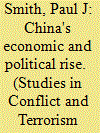

|
|
|
|
|
| Publication |
2009.
|
| Summary/Abstract |
As a rising power in the international system, China is discovering that, like many states before it, the ascendancy to great power status sometimes entails significant terrorism risks. Recent attacks against Chinese nationals (or commercial interests) in Africa, Central Asia, and South Asia appear to reflect this trend. In addition, since the early 1990s, China has endured a series of violent attacks emanating from (or associated with) its restive northwest Xinjiang Uighur Autonomous Region (XUAR). Beijing's search for energy security and its associated commercial activities in the Middle East, Africa, South Asia and Central Asia suggests that terrorism risks for China may increase in the future. In the wake of the 9/11 attacks in the United States and U.S.-Chinese counterterrorism cooperation prior to and during the 2008 Olympic Games, Washington and Beijing have discovered they have many common interests in countering the global threat of terrorism. However, for long-term cooperation to be sustained, the two countries must overcome or manage various disagreements on issues related to terrorism and the larger challenges associated with geopolitical competition. If these differences can be mitigated or resolved, China and the United States may be ideally positioned to establish a powerful and long-term bulwark against international terrorism and the instability that it promotes.
|
|
|
|
|
|
|
|
|
|
|
|
|
|
|
|
| 11 |
ID:
132476
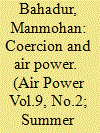

|
|
|
|
|
| Publication |
2014.
|
| Summary/Abstract |
Coercion has been the subject of many a study. To coerce an adversary's thought process and actions to one's own advantage is its end game. Paradoxically, there needs to be a con?uence of interests for discord to occur.' Coercion is not necessarily of the military kind only; in fact, a host of other measures constitute many permutations of actions that can be used to coerce an adversary's decision-making calculus. The North "Vietnamese took on the American military might in their unification effort, and movements and groups like Hamas and Hezbollah periodically fight the Israelis despite the military asymmetry that exists between the two; and the indigenous Afghans, in the long run, were not overawed, first by the might of the Soviet Union and then the Americans. In fact, one study suggests that the initiation of approximately 30 percent of conflicts has been done by the weaker party? Why does this happen and where does air power fit in the equation?
|
|
|
|
|
|
|
|
|
|
|
|
|
|
|
|
| 12 |
ID:
105885
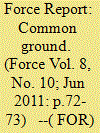

|
|
|
| 13 |
ID:
062373
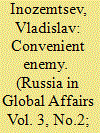

|
|
|
|
|
| Publication |
Apr-Jun 2005.
|
|
|
|
|
|
|
|
|
|
|
|
|
|
|
|
| 14 |
ID:
088768
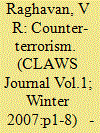

|
|
|
| 15 |
ID:
062298
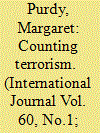

|
|
|
|
|
| Publication |
Winter 2004-05.
|
|
|
|
|
|
|
|
|
|
|
|
|
|
|
|
| 16 |
ID:
097949
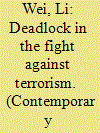

|
|
|
| 17 |
ID:
051819
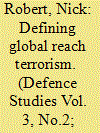

|
|
|
| 18 |
ID:
106272


|
|
|
|
|
| Publication |
2011.
|
| Summary/Abstract |
Global terrorism and local rebellion are observed rather frequently; solutions appear to be rather sparse. A common strategy adopted by governments is to attempt to deter potential rebels from engaging in acts of violence, often by responding to attacks with violent reprisals directed at the populace from which the rebels are recruited. The logic supporting such a strategy follows from a theory of deterrence that we believe is underdeveloped. This theory focuses heavily on the credibility of the deterrent threat and on ensuring that the cost imposed by retaliation is high. This ignores the flip side of the deterrent threat-that is, the promise that if one does not misbehave (by engaging in acts of rebellion), one will not suffer retaliatory punishment. Policy designed to ensure that punishment is swift and severe (and perhaps disproportional) can undermine deterrence and actually encourage more potential rebels to become active. Using a game-theoretic model, we show that successful deterrence requires a strategy in which retaliation is proportionate and directed only at the guilty, as well as being certain. Moreover, potential rebels must believe that the innocent will have attractive opportunities outside of joining the insurgency as well as that the innocent will not be punished. We provide empirical illustrations of our thesis from participants in the Palestinian uprising, including several who have taken up arms against Israel.
|
|
|
|
|
|
|
|
|
|
|
|
|
|
|
|
| 19 |
ID:
058008


|
|
|
| 20 |
ID:
134112
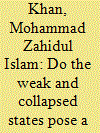

|
|
|
|
|
| Publication |
2014.
|
| Summary/Abstract |
Weak and collapsed states are portrayed as the primary global threat to security so frequently by the politicians, journalists and policy makers that it has almost become a reality. Yet, this seemingly universalised and undertheorised concept bears a different meaning to each actors and demands critical examination. From an international relations perspective, this paper examines the extent to which the weak and collapsed states challenge the realist account of maintaining world order. Conceptualising state weakness, this paper outlines the key realist assumptions to contrast those in weak states' context. Highlighting the realists underpinning that the structure of international system is resilient, the paper concludes that the concept of weak and collapsed states is a political construction and such states do not constitute a critical mass challenging the essential continuity of international order. International system is still dominated by powerful states and the opportunity for weak states to graduate upward under a resilient international system tends to outweigh the forces of weak and collapsed states, keeping the realist account of world order undaunted.
|
|
|
|
|
|
|
|
|
|
|
|
|
|
|
|
|
|
|
|
|